Unintended Consequences
Trigger Warning: Discussion of physical and emotional fallout from being starved as a child.
By now, we’ve all heard, and dissected, the story of the Vogue mom, Dara-Lynn Weiss, who put her 7-year-old daughter, Bea, on a diet because the daughter was “too fat.” Quite a few of us responded with outrage that this woman received a book contract about her ordeal of putting her daughter on a year-long diet.
When the story came out, I wanted to write this post, but I couldn’t. This is a very difficult post to write, but one I need to write, and I think some people may need to read. See, I was that daughter. Oh, I am not a 7-year-old girl whose mother writes for Vogue magazine, but I was put on a diet from the time I was 8 until I was 14.
For Bea, the achievement is bittersweet. When I ask her if she likes how she looks now, if she’s proud of what she’s accomplished, she says yes…Even so, the person she used to be still weighs on her. Tears of pain fill her eyes as she reflects on her yearlong journey. “That’s still me,” she says of her former self. “I’m not a different person just because I lost sixteen pounds.” I protest that, indeed, she is different. At this moment, that fat girl is a thing of the past. A tear rolls down her beautiful cheek, past the glued-in feather. “Just because it’s in the past,” she says, “doesn’t mean it didn’t happen.”
The summer before I turned 8, my mother married her second husband. Until that time, she and I lived with my maternal grandparents. I spent my years as a very active child. Sometimes my weight would go up (right before a growth spurt), sometimes it would go down (right after a growth spurt). A lot of times it would remained unchanged.
When I was six, I wore size 6 clothes. In the US in the early 70s, children’s clothing sizes were supposed to match up to a child’s age in years, so a size 2T (2 toddler) is for a two year old, a size 4 is for a four year old, a size 6 is for a six year old, and so on. At six, children’s clothing manufacturers created an extra size, a 6x that was bigger than a 6, but not as big as a 7.
When my grandmother and mother were looking for First Communion dresses for me (one month before my First Communion, which would be celebrated on my 7th birthday) I was in a size 6x. So, absolutely within normal parameters.
At the end of the summer my mother and step-father married. When we all moved in together, things changed. All of the sudden, I was “fat” and needed to be on a diet (I was wearing a size 7 at the time). That started years of regimens similar to what Weiss put her daughter through.
Every ounce I gained was cause for punishment and ridicule, every morsel of food scrutinized to make sure it had the least amount of calories. They didn’t worry about nutrition much, since they gave me a huge handful of vitamins every morning with breakfast to make sure I got the “recommended daily dose” of vitamins and minerals.
I was always hungry — ALWAYS. There wasn’t a minute that I wasn’t thinking about food, wondering how I could sneak some food without the parents knowing. I had to sneak food because my mother counted everything that could be counted. If she baked a batch of chocolate chip cookies, she’d count how many were in the bag before going to work and then when she got home, to make sure I didn’t eat any during the day. I was limited to three very small meals each day, no matter what my activity level was, with no hope for any kind of snack.
If I was at a party and I had cake or ice cream, I was in trouble when I went home because of course it’s reasonable to expect a child at a birthday party to say “no thank you” when offered cake and ice cream.
I had, and still have, many physical issues from this type of starvation.
The worst of the continuing negative consequences, though, is my relationship with food.
If I eat more than one meal a day, I’m upset with myself. You know, because I “ate so much, no wonder I’m such a cow.” It’s very hard for me to eat out at restaurants, since that was where the parents liked to humiliate me. “If you eat all that’s on your plate, other people are going to notice what a pig you are!” It doesn’t help that as a fat woman eating in a restaurant, many people think it’s their right to tell me how I’m eating wrong. That only reinforces what I’d been taught, that other people, upon seeing me eat, notice what a pig I am!
Half the time, I can’t tell when I’m hungry. As a defense mechanism, I learned to dissociate from hunger cues. It was the only way I could sleep or focus on anything. As an adult, I am trying to reconnect with those cues, but it only happens some of the time. There have been many times when I’ll proclaim I’m not hungry to my husband, who insists I eat something because “it’s been four days since you’ve eaten anything!” Then I inhale whatever he puts in front of me since, really, I didn’t know I was hungry until I started eating.
On the other hand, when I do feel those hunger cues, most of the times I won’t eat because that’s just my body lying to me. If I wait 30 minutes or if I drink enough water or if I read a book to distract myself the hunger will go away. Eventually, the coping mechanism kicks in and I don’t feel the hunger, which then results in four days of not eating.
It’s not that I’m trying not to eat. It’s that at 45, I’m still reacting with my childhood programming.
My comfort foods are saltine crackers with a very small amount of butter smeared on them. I found that, while she counted nearly everything, my mother never counted the saltines, so I could sneak a few (maybe 4) on occasion. But even then, I couldn’t do that very often, because any amount of added weight was suspect.
When I was 12 years old, my mother had me try on my First Communion dress, the 6x dress I mentioned above. There’s no way I should have fit into it. Other than the length, it fit me perfectly. In fact, it was a little loose on me. When I was 14, before I moved back in with my grandparents, I was 5’2″ and weighed 90 pounds. When I gained 5 pounds that year because I was starting to go through puberty, I got in trouble for being such a pig. Because I was so fat to begin with.
The message they gave me, and I internalized, was that I don’t deserve to take up any space in this world. I need to be cadaver thin if I’m going to be here at all. Any act of eating is wrong, especially for me, because I’m always so fat, even when I’m not fat. The humiliation they subjected me to constantly is still something I struggle with every single time I put any food into my mouth. It’s even worse when what I’m eating is what society has deemed morally lacking.
There’s still not a day that goes by when I don’t wonder if the parents were right and that I just need to starve myself, and stop taking up so much space in this world.
The physical consequences of my childhood diet remind me almost daily of what starvation during the formative years can do to a person. I have had dentists ask me if I was ever bulimic because the pattern of deterioration in my teeth is indicative of either bulimia or starvation. Those same dentists refused to believe the truth is starvation. My bones are more brittle because of the lack of calcium as a kid (milk was full of fat and therefore not something I could have a lot of), and I have a chronic vitamin D deficiency that was so bad at one point it almost caused me to commit suicide. I am also severely, chronically deficient in other minerals (potassium to name one). These all have had a negative physical and psychological impact in my life.
But the fear of eating in a restaurant, the feelings of humiliation when I look in the mirror sometimes, the emotions that I feel when I have to buy a size 24… these are the long-term effects of being told for years that I was too fat for the world, that I shouldn’t eat in front of others, that I shouldn’t even eat.
Like Dara-Lynn Weiss, my parents said they did it for my health and well being.
Like Bea, the consequences were not what my parents had hoped for.




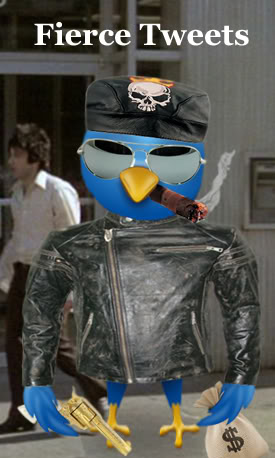


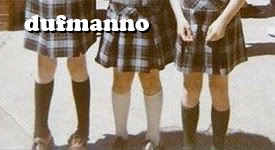
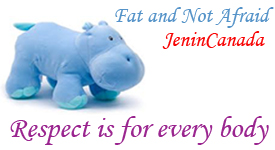

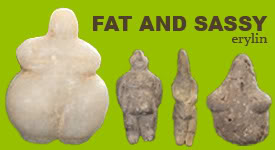
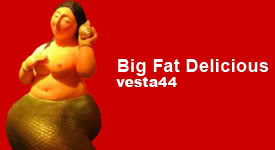





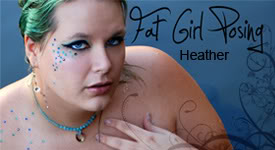


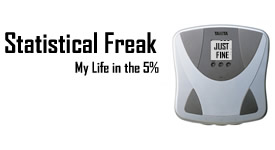


Reading this is so painful. I’m so sorry you had to endure this treatment as a child, and I’m even sorrier that the effects have stayed with you this long. Have you ever worked with a nutritionist or dietitian? Michelle Allison has her new group therapy approach, which might be good for working through these lifetime issues.
I’m sending you all the warmth and love and good vibes I can. You can absolutely break down these barriers to a normal relationship with food, but it takes work and time. I hope you find the strength you need to wrestle with these demons, because I know you can overcome this.
Thank you so much for sharing your story, Bronwen, despite the difficulty of doing so. I know others will take great solace in knowing they aren’t alone in dealing with the trauma of childhood dieting.
Peace,
Shannon
Shannon;
I have gone to a dietitian a few times. Most of the times, it was because the doctor (whichever one) was putting me on a new diet. They (the doctors and dietitians) didn’t believe I was eating as little or exercising as much as I said I was. The last dietitian I saw (again, sent by the doctor because of how fat I am) concentrated on what I ate, rather than how much, and said I was doing well (when I eat I tend to eat a lot of fruits and veggies, yogurt I make myself, if I eat bread, it’s bread I make myself, etc). But she never asked how many times a day I eat or anything like that. And of course, the rule of “don’t tell” is so strong I didn’t even think to offer that information up. (Well, Don’t Tell and having doctors and other medical personal call me a liar all of my adult life.)
I’d love to take Michelle Allison’s therapy, but the cost is a bit more than I can afford right now. Maybe if my candy business gets going and starts to bring in enough money that I’m not just funneling it back into the business, I’ll be able to do that.
A candy business-wonderful! Maybe if my proofreading and editing sideline ever turns into something, we can cross-advertise each other somehow.
I’ll have to follow your blog and keep up with your progress.
I was also diagnosed with a vitamin D deficiency, too. Not from childhood, I had a pituitary tumor. My teeth are also deteriorating. My dictor said that the D deficiency, is leaching the calcium out of my teeth.
It took until two years ago for doctors to identify the vitamin D deficiency with me. I’m on 6000 units every day. Every time I try to go off or cut down the dose, I immediately go back into deficiency.
I cried while reading this. Bronwen, I’m so sorry that you went through this and are having to deal with the results of it still. Parents need to realize how much damage they’re doing to their children when they focus on weight instead of health - and the damage is something that can years to heal from emotionally, but you may never fully recover from physically.
Thank you for sharing, but this was still horrifying to read. I’m angry that your mother had the expectation of your 6x Communion dress fitting at the age of 12. My nine year old still fits in 7s, but she’s just lean. I never deny her food or limit what she can have ( besides limited soda). But this makes me think of my stepdad. He watched what I ate, how big my portions were, etc. I still dislike eating in front of him and I’m 32.
I’m so sorry you went through this
Heartbreaking and beautifully written. That’s child abuse, plain and simple. I’m sorry that none of the adults in your life stood up for you.
This is brutal. My parents were downright kind compared to what you had to go through. So heartbreaking.
You fit into a Communion dress designed for a six year old at 12? What your family did was not abuse, was not unfortunate, was not tragic…it was pure evil.
Yes indeed-evil describes it very well. Absolutely heartbreaking.
Thank you so much for sharing your story, Bronwen, and I’m sad to say that you’re not alone. Your parents, and any that do this kind of thing, are engaging in abuse, and I hope that someday you can more fully heal from the damage they’ve done.
This was just so very sad. I curious, Did your parents ever realize the damage that they inflicted upon you? Did you confront them when you became an adult? What kind of relationship,if any do you have now? And why for god sake didn;t anyone notice and speak up for you? This abuse just sickens me
I never had the chance to confront the step-father, not that he would ever have listened to me. He once told a family therapist, “Where she is concerned, I’m right 99.9% of the time. The times I’m not right are so unimportant that they don’t matter.” The therapist wasn’t exactly a good one (the first in a long list of not so good therapists). While she did press him on the matter, she only got him to come down to “95%, but the times I’m wrong are still so unimportant that they don’t matter.”
Yeah, I still remember that day.
I’ve confronted my mother on things (although I never have confronted her about the starvation and it’s long term physical effects on my life), but she is the type of person where everything that goes wrong is somebody else’s fault. I just happened to be her favorite scapegoat. :/
The reason nobody saw or spoke up, about this and the other severe abuse, is that it was in the 1970s. First, my mother completely alienated the rest of her family who would have (and did) say things about her and the step-father’s treatment of me. She cut all ties with them and forbade me to communicate with them by any manner. There was no such thing as “grandparent rights” back then. And while the teachers at school saw the results of the abuse, there wasn’t much they could do. If the teachers intervened and my parents chose to pursue it, they could possibly have have gotten the teachers fired.
There was one person, when I was in 8th grade, who did intervene. He was the principal of the school, and he had a phone call with my mother that stopped the physical abuse, at least until I was out of that school. I don’t know what he said to her, but looking back, I know he said something. He was the only one who ever tried, that I know of, and who actually took me seriously when I confessed to being abused (only, you know, I didn’t put it that way, because I believed it was “just punishments” that I deserved for being so bad).
At this point in time, the step-father is dead, and I have absolutely no relationship at all with my mother. It’s much better that way.
I’m so sorry.
I was put on diets from age 7 but I had great-aunts and so on who would feed me on the quiet. Now I have a guilt complex about eating and food security issues but no chronic vitamin deficiencies and my teeth are fine. I can’t fathom a 12 year old wearing a size 6x. I just can’t.
I am so so sorry for what you went through, but I hope sharing your story helped you and can help others.
I guess I can consider myself relatively lucky by comparison - for whatever reason my mother didn’t have it in her to actually control my diet. I didn’t start getting chubby until around age 10 and I don’t think it would ever have occurred to her to tell me I couldn’t eat something or to limit my portions. But - she had the tried and true standbys of Guilt and Nagging on her side. Instead of physical restriction of food I experienced psychological warfare. Everything I ate I was told how many calories, fat, sugar, etc. Every bowl of chips was accompanied by the wheedling question “Wouldn’t you rather have some carrot sticks?” The amount of self-loathing I built up over my failure to diet is horrific. I was a “bad” person for eating “bad” food. But my mom had her chocolate stash and I knew where it was. Growing up I was told food was my enemy, but I know food was my only safety, my self-medication. I’ve come a long way in my relationship with food, but I still have to ride out the urge to binge on sugar when I am in crisis mode. If my mother hadn’t been so obsessed with food, I don’t believe I would have developed into a compulsive eater. I wish she had lived long enough to discover HAES and SA/FA with me - I can’t help thinking how much happier both our lives could have been.
I can relate to this. My mother had a chocolate stash too. I resolved never to have food stashes. The food was out in the open. My deal was telling my son he could have whatever food he wanted in moderation, and he had to have some “real food” before eating stuff like candy. I hope I didn’t create a complex for my son in relation to food, but I don’t know. It might be impossible, given the issues I have with eating. He says he has to remember to eat because he doesn’t like to eat. He finds it a “boring” activity, in his words.
This made me cry. Any person made to feel they are not worthy of even occupying space is horrifying. That is one of the stupidest myths a parent can teach their child, of not being worthy. I can really associate with this, but definitely not at this level. When I reached puberty, I started to gain weight a little more than “normal” and would start to hear little comments from my mother. I would feel uncomfortable around my peers… I never really associated my skipping meals to feelings of unworthyness, but that’s what was there for the longest time, self-loathing. I think, like you, I’m still trying to read my hunger cues since it is hard to be in tune with it, if you’ve disconnected with it for so long.
Thanks for sharing your story.
Thank you, everybody, for your kind responses.
I was always told “don’t tell” while living in the parents house. “We don’t hang out our dirty laundry for everybody else to see!” So “not telling” is really easy. And when I do tell, it’s extremely hard.
For those who mentioned abuse, yes, I was severely abused as a child, and the way they fed (or rather, didn’t feed) me was only one very small aspect of it. It took me until I’d bee in therapy for a few years in the mid-90′s before I realized what they did with the food was just another part of the abuse. It took until I was helping to raise my step-daughter to really understand just how little they fed me.
I have been in therapy for the abuse since 1990. There’s been a lot to heal from, and the fact that I can now work on the “small” things, like my relationship with food, shows just how much progress I’ve made. It’s as hard of a struggle to change this as it was to change other aspects, but the fact I can actually work on this now, and am actively working on this, is a good sign. Hopefully it won’t take another 22 years to get everything worked out!
Again, thank you everyone, for your kind responses. “Don’t tell” is still has a very hard hold in my life, though I do my best to challenge it when I can.
As someone else who was abused sexually, physically, and mentally, the “Don’t talk about what goes on at home to anyone else” is always a huuuuge red flag for me that the abusers are completely aware of what they’re doing, and how it’s not smiled upon or necessarily legal. My mother herself gave me that line when I was younger, because she knew a lot of what my father did wasn’t normal or accepted, but yet she continues to call me a liar for truthfully claiming that my father sexually abused me for years.
and thank you for responding to my query in such detail and sharing your story so eloquently.
Thank you for sharing. This is an important story that people need hear; alas that media outlets like Vogue continue to ignore it.
You are a strong and powerful individual.
I’m so sorry you went through that. All the diet stuff is self imposed (although these days half the time I can’t even afford food, so it’s starvation out of necessity rather than choice) in my case. What the deal was in my family was you were supposed to eat hardy but not gain weight, because if you were getting enough exercise, you wouldn’t gain weight.
My late father was not a mean person. He would never have advocated saying cruel things to someone who was fat. But he was a healthist, and he pushed heavy exercise. He didn’t mean to, but he created a horrible complex for me whereby any time I rest I feel that I am lazy, and it’s hard for me to start anything because I don’t want to start anything I can’t be perfect at. I know now that he was harder on himself than he was on anyone else, and he also had undiagnosed OCD.
This did not do well for him after he had a stroke. The things he called himself (i.e. damn cripple) were horrible. He would not do the recommended exercises because that was not “real exercise.” He wanted to be able to run again. He felt he was a failure for anything less.
These days I still fight with the inadvertent message from my father that I must exercise for several hours a day for it to count at all, and the overt message from society that if I put a bite of food in my mouth, I’m a disgusting pig.